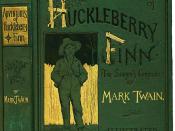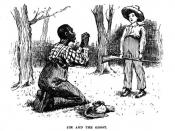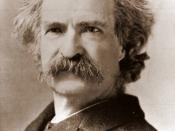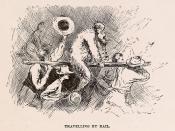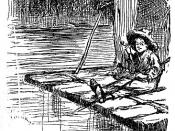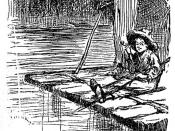Mark Twain's Huckleberry Finn is the story of a boy and an escaped slave journeying down the Mississippi prior to the Civil War. The novel is essentially a tale of escape. Jim, the runaway slave, is fleeing down river in order to escape his owner, Miss Watson, who had intended to sell him to a plantation down South. Huck, the narrator of the story, agrees to help Jim on his journey despite ramifications of being labeled "a low down Abolitionist"ÃÂ (Clemens 39). Huck also fears being discovered by his abusive, alcoholic father. In essence, however, Huck is actually fleeing "sivilized"ÃÂ society as a whole. Though Twain throws Huck's motives into doubt with his near betrayal of Jim in Chapter XVI, he makes it clear in Chapter XIX that Huck's true joys lay in the freedom and escape from society. Henry Nash Smith claims that Huck's moral dilemma is employed by Twain to contrast "accepted values"ÃÂ versus "vernacular protest"ÃÂ (Smith 371).
Thus, although he has a major crisis of conscience along the way and comes close to turning Jim in, throughout the journey Huck is trying to escape the ugliness and hatred of the river society. This is crucial to Twain's larger message as he shows the dark underbelly of Southern culture through his satire of the river towns. Yet the reader is left uncertain after Chapter the Last as to whether Huck will actually be able to escape societies corrupted values. As Toni Morrison puts "Twain did not write Huck there"ÃÂ and thus it cannot be assumed Huck will ever be free from society's grasp (Morrison 392). Despite Huck's assertion that he will continue his journey to the Territory, he will never be able to run far enough to escape the hatred and hypocrisy of society.
At the start of the journey down river, Huck pledges to help Jim on his escape to freedom. Their plan is to float down river on the raft by night, stopping occasionally to "borrow"ÃÂ supplies (Clemens 56). When they reach Cairo at the mouth of the Ohio, they plan to sell the raft and secure passage on a steamboat up river into free territory. However, Huck's motives can be questioned more than a few times along the journey. While aboard the wrecked steamboat, Jim begs Huck to leave and forget about any valuables they might be able to salvage. Nevertheless, Huck insists on staying and in the process nearly gets them both killed. Huck's actions also seem dubious when he attempts to trick Jim after they become separated in the fog. However, the most troubling situation of all comes as the raft nears Cairo. Jim is excited by the prospect of his freedom, and tells Huck his plan to buy or steal his wife and children from slavery. Huck's conscience begins to speak to him, essentially becoming a character in the scene. It addresses him in "the language of the dominant culture,"ÃÂ accusing him of stealing from Miss Watson and the owner of Jim's family (Smith 372). Huck feels "so mean and so miserable that I most wished I was dead"ÃÂ (Clemens 73). The twisted morals instilled in him by the Southern slave society take on the form of his conscience, making him feel as though he has betrayed the "sivilized"ÃÂ ways. The culmination of Huck's moral struggle comes as the slave hunters question him. His conscience, which has been warped by the flaws of society, makes him believe turning Jim in would be the right thing to do. In his heart, however, Huck is unable to betray his companion. Ultimately, Huck's "fidelity to the uncoerced self"ÃÂ wins out over the "blurring of attitudes caused by social conformity"ÃÂ (Smith 372).
Although Huck does not expose Jim, his goals for the journey still seem unclear. Remarkably, he takes no drastic action after the raft floats past Cairo. Granted, they had lost their canoe and thus their only means to travel back up river. Yet Huck could have done something once they reached the clear waters of the Ohio. Jim is a passive character, following Huck's lead throughout the novel, so it is not surprising that he is unwilling to take charge of his own fate. Their decision to "go along down"ÃÂ the river until they find a canoe almost sad because of its remoteness, and the reader is forced to all but give up on the possibility of Jim's freedom (Clemens 78).
Immediately following their decision to continue down river, a steamboat strikes Huck and Jim's raft, separating the pair in the dark water. Huck ends up on the Grangerford Plantation, thus beginning the episode of the Grangerford-Shepherdson feud. At this point, Twain gives the novel new direction. He essentially abandons the escape plan and shifts the novel's focus to a social satire of the towns along the river. In the following land episodes, Twain introduces the Duke and the King to exploit the "prejudices and delusions"ÃÂ of the towns while showing that "dominant culture is decadent and perverted"ÃÂ (Smith 366). Twain's criticism and mockery of that society makes it clear why Huck wanted to leave it in the first place. Indeed, Huck is so sickened by the Grangerford-Shepherdson affair and the death of his friend Buck that he "wished I hadn't ever come ashore"ÃÂ (Clemens 94). He is extremely happy to set back out on the river with Jim after the ordeal. While it is not strange that he would want to escape form such a bloody feud, his treatment of Jim is strange. The whole time he stays with the Grangerfords, he does not even think of Jim. Huck is content to live in the big house and eat the good food and have his own slave. Only accidentally does he rediscover Jim, and even then he does not return to him until his own life is threatened by the feud. Indeed, by Chapter XIX it is becoming more and more apparent that the journey is an escape for Huck, not Jim.
In Chapter XIX, Huck and Jim have a brief period to themselves as they continue to float down the river. As Huck put it, the days "swum by"ÃÂ as he and Jim traveled by night and hid by day (Clemens 96). This period of the journey seems the most enjoyable to Huck. They are free from society and live in a natural state. After his ordeal with the Grangerfords, Huck especially appreciates "listening to the stillness"ÃÂ of the river and describes their free life on the raft as "lovely"ÃÂ (Clemens 97). During this three-day period, they spoke to no one and thus had no contact with society. They stopped and hid by day to sleep and take in the sights and sounds of the river. So isolated were they that Huck says, " we was always naked, whenever the mosquitoes would let us"ÃÂ (Clemens 97). By shutting themselves off from society and rejecting even its most basic elements, such as clothing, Huck and Jim have reached the ultimate state of natural freedom. They live on equal terms and enjoy the simple pleasures of "songbirds"ÃÂ and "everything smiling in the sun"ÃÂ (Clemens 96). However, this retreat from society is fleeting, and by the end of the chapter they will already be involved the Duke and King's treachery. And even though Huck enjoyed it immensely, it is likely that Jim did not. There is no plan for Jim's freedom even mentioned in this chapter, and things are looking more and more hopeless as they travel farther and farther south. Indeed, this episode is simply a temporary escape for Huck, and though he will continue to search for a place free from the prejudices of society through the end of the novel, this is the closest he ever comes. In the end, Huck can never find a place "free of social chaos,"ÃÂ not even the Territory (Morrison 392). Even if he could find a place with true social equality and freedom, he could not do it without Jim. As Morrison says, "Huck cannot have an enduring relationship with Jim"ÃÂ and thus will be unable to complete his moral quest for a place without "personal morbidity"ÃÂ and "moral complications"ÃÂ (Morrison 392).
In the end, Huck's quest for freedom is without justification. He is fleeing from the abuse of his father, the loss of his childhood, and a society of debased and corrupted morals. In essence, what starts as a flight for Jim's freedom becomes an escape for Huck. Yet he will never truly find the permanent he yearns for. His brief interlude along the river is the best he can do. In a sense, the journey itself becomes his freedom, and at the end of the novel he is unwilling to give it up. If he is to achieve the liberty he seeks from society, however brief, he must keep moving. For although the true freedom Huck seeks is unattainable, he has to keep searching. He must keep moving, staying unattached to a certain social climate for too long. This concept is key to Twain's overall message, for while he makes it clear that liberation from society's corruption is ultimately impossible, he nevertheless maintains that Huck must keep going. For as soon as he settles in, he risks being "sivilized,"ÃÂ which can only lead to conformity and the loss of his own morals.
